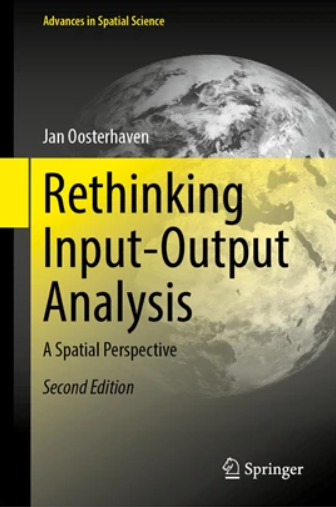
Rethinking Input-Output Analysis
A Spatial Perspective
Author
Jan Oosterhaven, University of Groningen, The Netherlands
Springer Nature Switzerland AG 2022
About the book
This textbook helps students to understand the social, economic, and environmental importance of the mutual relations between industries in the same and in different regions and nations and demonstrates how to model these relations using regional, interregional, and international input-output (IO) models. It enables readers to extend these basic IO models with endogenous household expenditures, to employ supply-use tables (SUTs) that explicitly distinguish the products used and sold by industry, and to use social accounting matrices (SAMs) that detail the generation, redistribution and spending of income. In addition to the standard demand-driven IO quantity model and its accompanying cost-push IO price model, the book also discusses the economic assumptions and usefulness of the supply-driven IO quantity model and its accompanying revenue-pull IO price model. The final chapters highlight three main applications of the IO model: (1) economic impact analysis of negative supply shocks as caused by, for example, natural disasters, (2) linkages, key sector, and cluster analysis, (3) structural decomposition analysis, especially of regional, interregional, and international growth, and demonstrate the strengths and weaknesses of these IO applications.
Written for graduate students of regional and spatial science as well as for economists and planners, this book provides a better understanding of the foundations, the power, the applicability and the limitations of input-output analysis. The second, completely revised edition expands on updating IO tables, modelling the disaster reconstruction phase, and includes an appendix on the necessary matrix algebra.
Publication Date: 18 June 2022 | ISBN 978-3-031-05089-3
Author

Jan Oosterhaven is Professor Emeritus of Economics at the University of Groningen (The Netherlands). His research focuses on interregional input-output analysis, indirect effects of supply shocks, and integral cost-benefit analyses of all kind of spatial and infrastructure measures. He was Editor of Economic Systems Research (1994-1998), President and Vice-President of the International Input-Output Association (2001-2009), and won the European Regional Science Prize in 2015.
More information from the publisher
Learn more on ERSA members published books here.

Stay updated on ERSA upcoming activities, subscribe to ERSA E-newsletter
